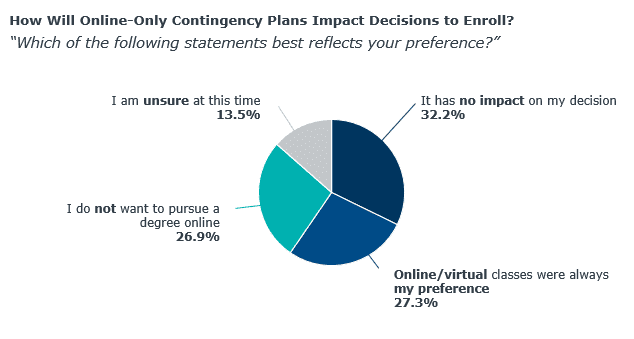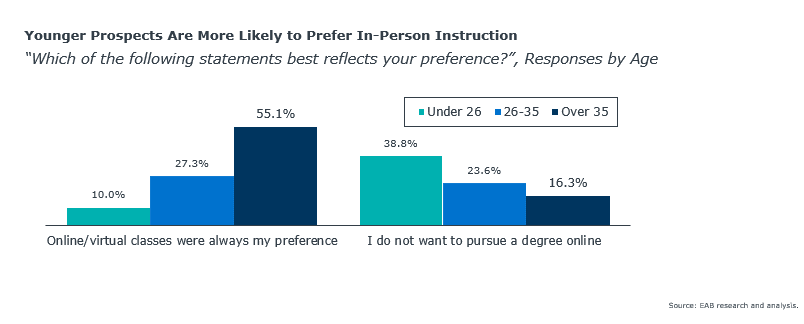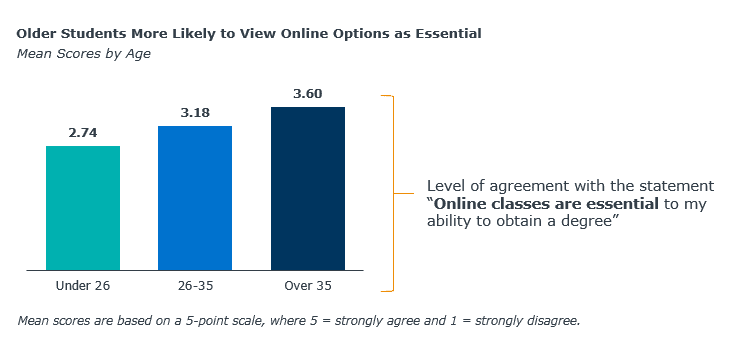How going remote will impact your graduate enrollment funnel
3 insights from EAB’s latest adult learner surveys
August 27, 2020
Over the past few weeks, the question of whether to bring students back to campus for the fall has made headlines and dominated discussions among campus leaders. While many graduate and adult-serving programs have decided to go fully remote, others are aiming to teach students on campus, with online contingency plans close at hand.
In my conversations with individuals from both groups, graduate leaders are eager to understand how the transition to remote coursework might impact enrollment plans. EAB’s Adult Learner Recruitment team recently conducted a series of surveys of adult learners and graduate enrollment leaders that sheds light on this topic.
Below are three survey insights that help explain how students and enrollment leaders are thinking about online and remote instruction during the pandemic.
1. Three quarters of adult learners are open to online courses during COVID-19
When we asked prospective adult learners about how remote instruction might impact their plans to enroll, 73% were open to it. That group included the 32% of all respondents who said that remote delivery would have no impact on their decision, the 27% who said that online classes had always been their preference, the 14% who said they were undecided.
While it’s reassuring to know that most students are open to online options during COVID-19, this finding isn’t surprising—it’s completely consistent with recent trends in the master’s market, where all enrollment growth has been in online and hybrid programs.

Recommendation:
While most adult learners we surveyed were open to online instruction, a full quarter indicated that they did not want to pursue a degree online. If your institution is shifting to online instruction because of the pandemic, be prepared to manage increased turbulence in your prospect pool. By deploying brief prospective student surveys, you can gain valuable insight into your enrollment funnel health and your students’ plans and concerns.
2. Older adult learners are more open to online course delivery
In our research, we also explored which types of students were most resistant to online education during COVID-19, and we found that openness to online options highly correlates with student age. Many assume that younger students, as a generation who grew up with the internet, might be most amenable to switching to fully virtual coursework. However, we found the opposite is true: older students were more open to online courses. And younger students were more likely to say that they did not want to take a degree online.

This finding is consistent with data from our winter 2020 adult learner survey, which showed that older adult learners were more likely to view online options as essential to their ability to obtain a degree. Since older adult learners are more likely to have childcare obligations and established careers, they tend to prefer flexible options that allow them to work around their existing professional and personal obligations.

In our survey research, we’ve also consistently found that younger adult learners, on the other hand, place much more value on campus experience. For that reason, younger adult learners will be more likely to question the value of whether remote coursework truly offers the same value as an in-person experience.
“Online learning deprives me of the same faculty engagement and opportunity I was looking for in a residential graduate program. I am currently unable to make those personal connections, go to networking and professional development events, and intern in my field. That is an integral part of my graduate education and without it, the sky-high cost is not worth it.”
–Survey participant
Recommendation:
Be sure to tailor your marketing to students’ preferences. To appeal to younger adult learners, marketing should highlight the value offered through your degree and address concerns about lack of on-campus support services. Now more than ever, messaging about return on education is essential to engage and recruit younger adult learners. For older adult learners, marketing should highlight the flexibility and potential for school-life balance that online options offer.
3. The majority of enrollment leaders plan to expand fully online graduate courses and programs
In addition to surveying students, this spring we also collected feedback from graduate program leaders about how the pandemic would influence their enrollment strategies. As of April 2020, most leaders said that they would plan to offer more fully online options due to the pandemic. While online programs have been a major driver of adult learner enrollment growth for years, it’s notable that many leaders are doubling down here because of the pandemic.
-
65%
of institutions plan to expand fully online offerings
However, as our findings about student perceptions illustrate, online options will not appeal to a large segment of students. And as institutions develop plans for new online courses and programs, they’ll need carefully assess which programs would be most successful online.
Recommendation:
When considering which programs and courses to take online, prioritize high-enrollment courses and building blocks for full degree programs. Enrollment leaders should also consider competitive intelligence, historical enrollment, and revenue performance. In addition, be sure to develop a comprehensive, prioritized course and program migration plan that can guide allocation of instructional design resources.
Each institution needs a graduate enrollment strategy that addresses both the on-campus context and the pandemic’s impact on the region. These insights can arm you with more data as you navigate a turbulent environment.
More Blogs

What it takes to win in grad and adult enrollment today

Our new staffing model playbook for higher ed CMOs
